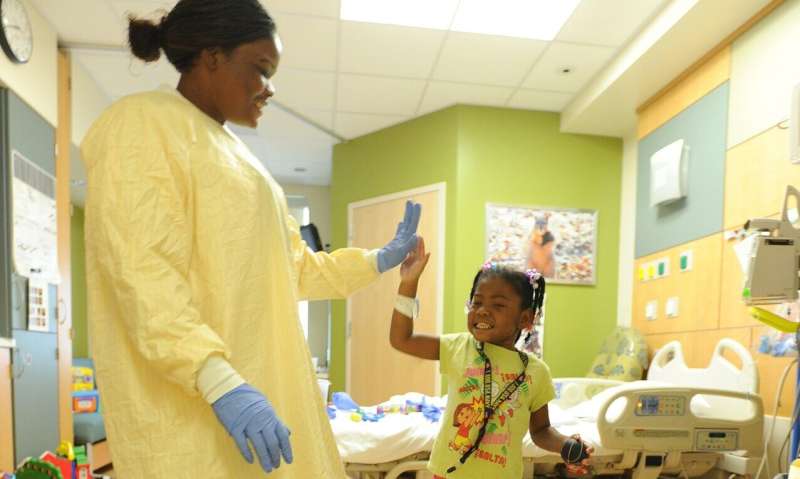
How should others make decisions for pediatric patients?
For decades now, there has been debate in academic literature about the ethical principles that govern medical decision-making for children. In response to this, a group of leading scholars in pediatric ethics participated in a June 2022 symposium, “Best Interests and Beyond: Standards of Decision Making in Pediatrics,” at Saint Louis University. Over the course of three days, the 17 scholars debated one question—in the context of U.S. pediatric care, what moral precepts ought to guide parents and clinicians in medical decision-making for children?
A group of leading scholars participated in a June 2022 symposium, “Best Interests and Beyond: Standards of Decision Making in Pediatrics,” at Saint Louis University. Submitted photo.
The symposium and further discussions led to six recommendations for pediatric decision-making. Those findings, “Pediatric Decision Making: Consensus Recommendations,” appeared in Pediatrics.
Erica K. Salter, Ph.D., associate professor of health care ethics and pediatrics at Saint Louis University, is the paper’s lead author. Johan Bester, M.B.Ch.B, Ph.D., associate dean for pre-clerkship curriculum at Saint Louis University School of Medicine and Lou Vinarscik, an M.D./Ph.D. student in health care ethics, also contributed to the work. Bester is an associate professor in family and community medicine and health care ethics at SLU.
The American Academy of Pediatrics offers four standards for pediatric decision-making—the Best Interest Standard, Diekema’s Harm Principle, Ross’s Constrained Parental Authority and Shared Family Centered Decision Making. This constellation of principles often left pediatric clinicians confused about the ethical norms of decision-making, especially when parents and physicians disagree about a particular course of action.
The recommendations from the SLU symposium aim to provide a unified set of decision-making principles that will be more accessible and applicable for clinicians, parents and legal guardians for children from infancy to primary school.
This work brought together experts in pediatric ethics who have defended different points of view and who have different backgrounds and perspectives. The stand-out feature of this work is that they could identify points of consensus regarding which moral precepts are fundamental to medical decision-making for children.
“The fact that this group of distinguished pediatric ethicists, in particular, was able to reach consensus about these six recommendations represents an important step forward in pediatric ethics,” Salter said.
Recommendations
- Parents should be presumed to have wide, but not unlimited, discretion to make health care decisions for their children.
- Parents should protect and promote the health interests of their children while balancing practical constraints and/or other important obligations and interests.
- A clinician’s primary responsibility is to protect and promote their pediatric patients’ health interests. Clinicians’ recommendations should be informed by professional judgment and the best available evidence.
- To respect children and promote their well-being, clinicians and parents should inform pediatric patients of salient information and invite their perspective to the degree that it is developmentally appropriate.
- In addition to fulfilling state-mandated reporting requirements, clinicians should seek state intervention when all less-restrictive alternatives have failed and a parental decision places the child at significant risk of serious imminent harm or fails to meet the child’s best interests.
- Clinicians and parents should strive to collaborate in a shared decision-making process to promote the child’s interest.
“With these recommendations, we hope that pediatric providers feel better equipped to engage in decision-making with parents and patients, especially when there may be disagreement. It can be very distressing when providers and parents disagree about what treatment option is best for a given child, but differences of opinion are not uncommon and should sometimes be expected,” said Salter.
“The recommendations demonstrate that parents and physicians come to the decision-making table with different sets of priorities because they play different roles in the decision-making process. Pediatric providers can now engage in those discussions with a better sense of their role and its ethical justification.”
This work will help practicing clinicians and bioethicists to make decisions for children grounded in shared moral values. These principles will also help with teaching of pediatric ethics, and with guiding academic work in the field of pediatric ethics.
The authors say further evaluation is needed to determine if these principles apply to newborn babies, teenagers and wards of the state or if modifications are needed for those patient populations.
More information:
Erica K. Salter et al, Pediatric Decision Making: Consensus Recommendations, Pediatrics (2023). DOI: 10.1542/peds.2023-061832
Journal information:
Pediatrics
Source: Read Full Article